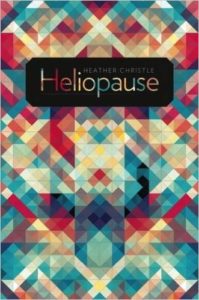Heliopause
 by Heather Christle,
by Heather Christle,
Wesleyan University Press, 2015,
112 pages, cloth, $24.95,
ISBN 978-0-8195-7529-6
Buy the Book
Heather Christle’s new book, her fourth, takes its name from a zone of transition: the edge of our solar system, where the Sun’s area of dominion shifts into interstellar space. As the book notes, the public was recently reminded of the heliopause when the Voyager spacecraft crossed it in 2013 on its way to deep space. The metaphor of a transition zone remains a striking presence throughout Heliopause, in which, against the backdrop of a dismantled space program, Christle makes record of personal and national loss.
Heliopause situates itself in a post-9/11 landscape that is not, in fact, very post- at all. The collection is organized around several sequences; the first, “Disintegration Loop 1.1,” is a compelling ekphrastic response to William Basinski’s September 11th footage and “decaying pastoral loop.” Drawing on the concept of challenging reflexive loops for conflict resolution, Christle wrote each morning for several weeks alongside Basinski’s video. The resulting sequence is a fascinating meditation on fear and falling, as well as the limits of structure and structures. In this procedure, “every morning the diminishing returns” and light is tempered with the trace of darkness.
Throughout the collection, Christle’s formal movements emphasize the repetition and randomness of loss. An erasure from the transcripts of the first moon landing, “Elegy for Neil Armstrong,” presents text in white against a black page, compressed into short articulations of presence. One of Christle’s gifts is the ability to express even the most abstract pain as personal, oscillating between a collective “we” and a personal voice to address Armstrong. “Neil,” she writes, “I’m with you / (garbled).” The epistolary “Dear Seth” reaches across a long-distance friendship, as does a poem for the late Bill Cassidy: “Hey Bill / where you are / do you see letters.” In each poem, Christle explores the use of language to frame each shifting circumstance of being, a tool to “consider” or “confess”:
Dear Seth
There is fear the baby
when it arrives will be wrongly
or poorly loved
that the world is no place
for helpless things
You will see
reading this through your good beard
how neatly
I have left myself out
though I understand
come spring
such grammar tricks
will no longer work
Christle’s striking honesty is tinged with the eeriness of public consciousness; a choice of movie times is driven by calculations of the likelihood of mass shootings, and even the lights themselves tremble. Each line asserts itself with a subtle elegance, reminiscent of Rae Armantrout, and an openness that allows the simplicity of life to be reflected in the lines: this morning worthy of significance as readily as meditations on the nature of mortality. Both life and language are bare and painful in Christle’s composition, and this precision allows us access to the speaker at her most vulnerable, and often most charming, moments:
in the winds
just remnants of the storm
that wouldn’t stay
I have thought
to run away from what I own
Who hasn’t
but what else do I have
Where would I go
The sky is everywhere
at once like a big movie
and though I think I know how
it’s going to end
and with what music
there is uncertainty enough
to hold me still
As the book progresses, the sense of complete envelopment in the “pathless field” is remarkable; Christle writes, “It’s the same problem / in any direction.” Yet despite the speaker’s assertions of her own “dumb” responses, what emerges here is a bright and thorough meditation on what it means to be inherently irresolute. With sincerity and intelligence, Christle’s book bravely seeks connection amidst chaos; in doing so, she offers a model for how to find meaning in the impossibly brief and immeasurable. Rather than seeking to dampen the impact of fear, these poems offer a nimble portrait of its daily iterations. In a time when we are distinctly aware of the limits of human intelligence and empathy, Christle’s Heliopause gives voice to an essential plea: “touch me / touch me.”
— Kate Partridge

